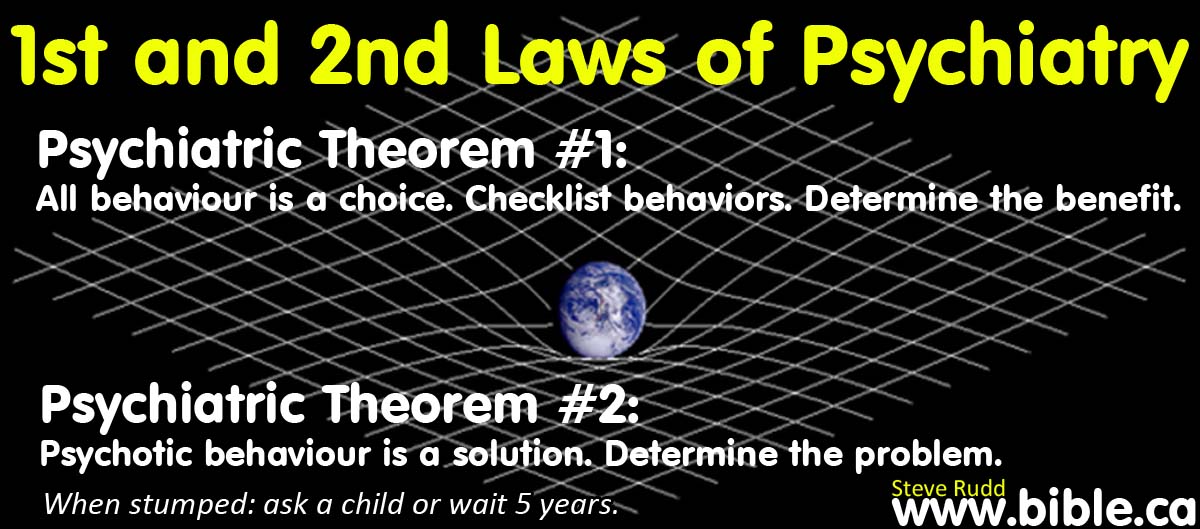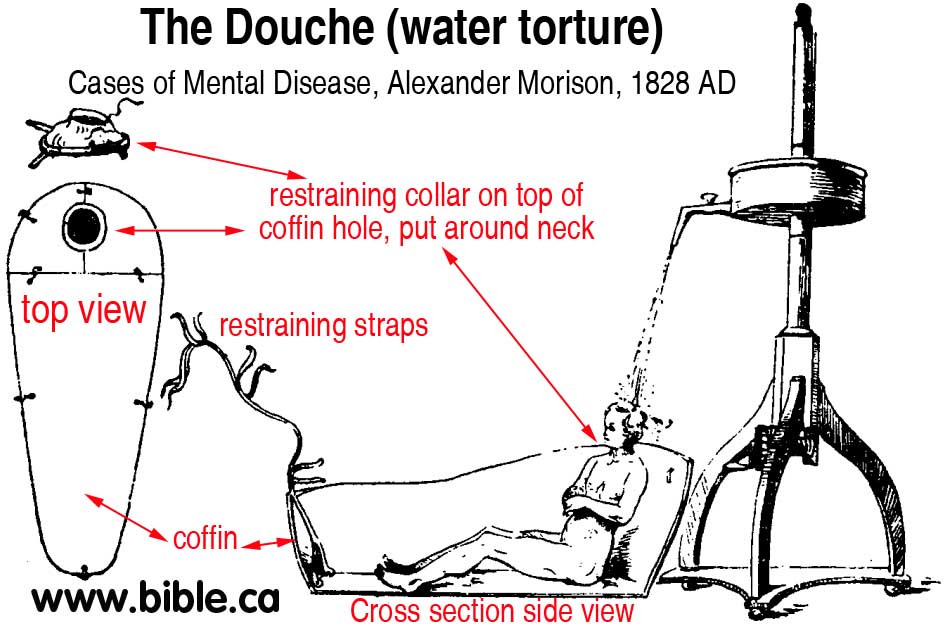The case of "Subterranean" (Schizophrenia)
Casebook of Biblical Psychiatry © Version 7 (CBP-7)
|
Based upon |
Casebook of Biblical Psychiatry© brings the principles of Biblical Psychiatry to life based upon real-world cases and familiarizes Christians with different types of situations. This practical companion volume to Biblical Psychiatry© includes not only diagnosis, but also in-depth discussions by experienced Christians for Biblical approaches to treatment. This meticulously detailed volume of dynamic real-life case studies is simply a "must read" for all clinical Psychiatrists, mental health care professionals and Christians interested in expert opinion on today's treatment approaches. Psychiatric students, educators, and practitioners—as well as social workers, nurses, medical physicians, and interested laypersons—will find this unique volume of inestimable value in their day-to-day work.
|
|
|
|
|
The case of (Schizophrenia) |
|
|
|
|||||
|
|
The case of "Subterranean" |
||||
|
|
Biopsychiatric labels DSM-5 |
Schizophrenia, delusion, paranoia |
|||
|
|
Checklist Behaviours DSM-7 |
Drunkenness, laziness, Deception, lying |
|||
|
|
Insights MMPI-7 |
|
|||
|
|
Quick Pick EDS-7.1 |
Sloth: duty shirking, dependency, Insanity |
|||
|
|
Self-disablement EDS-7.2 |
Employment: Time off work in asylum |
|||
|
|
Chemical imbalance EDS-7.3 |
||||
|
|
Benefits EDS-7.4 |
Fun, entertainment, relief from boredom and monotony: EDS-7.4.2 Escape duty or life situation: EDS-7.4.4 |
|||
|
|
Monetary EDS-7.5 |
- |
|||
|
|
Annoyance Scale EDS-7.6 |
High |
|||
|
|
Diagnostic Laws EDS-7.7 |
Law of Narcissistic Behaviour Choice (NBC) EDS-7.7.1.NBC Law of Derivative Personal Benefit (DPB) EDS-7.7.2.DPB Law of Narcissistic Selective Dysfunction (NSD) EDS-7.7.3.NSD Law of Domino Problem Transference (DPT) EDS-7.7.4.DPT Law of Manipulative Rhetorical Malingering (MRM) EDS-7.7.9.MRM Law of Habitual Smokescreen Decoy (HSD) EDS-7.7.10.HSD |
|||
|
|
Determine the Problem |
A drunk had formed the habit of being lazy |
|||
|
|
Ask a Child |
||||
|
|
5 years later EDS-7.7.LPT |
He repented and returned to work. |
|||
|
|
|
||||
Alexandre J. F. Brierre De Boismont, 1839 AD: A worthless drunk chooses to become schizophrenic to escape work duties but is cured after 6 water torture treatments at Bicetre asylum.
Example 134. A., aged forty-two, a carpenter, had drunk freely and was of an impatient and excitable disposition. He was brought to the Bicetre, 18th June, 1839, suffering from various hallucinations. He was treated by the application of cuppings to the neck, baths, with affusions, foot-baths, and lemonade. Afterwards, he was ordered to work, but this he obstinately declined doing. The douche was given to him several times, and he promised he would work, but failed to do so. On the 12th of September, M. Leuret, who was now in attendance, questioned A. as to whether he intended to work. This he refused to do. A. was immediately conducted to the bath, and placed under the douche. M. Leuret then interrogated him, and desired him to relate what had happened to him since he had been in the Bicetre. After having listened for some time to all the statements of A., M. Leuret spoke to him as follows : "Now, A., I am going to tell you what I think of all you have told me : there is not a word of truth in anything you have mentioned ; all you have been telling me is sheer nonsense, and it is because you are insane you have been placed in the Bicetre." Here A. replied: "Monsieur Leuret, I am not insane; I cannot help seeing the persons who are under my bed and in the subterranean passages, because they are there. You maintain that all I have been saying is nonsense: I wish it was so, but I know what I see and hear. After what you have said, is there, then, no hope of my getting out of this place?" "You will go out, but on one condition. Listen to what I am going to tell you. You will only go out when you are no longer insane, and this is what you must do in order to show you are not: you must no longer look at the sun or the stars; you must not imagine that there are subterranean passages beneath your bed, because there are none; you must not believe in the voices which come from these passages, because there are neither voices nor persons speaking in these passages, nor do they exist. In addition to this, you must never refuse to work, whatever may be the kind of labor you are ordered to do. If you wish me to be satisfied with you, you must be perfectly obedient, because all that I require of you is perfectly reasonable. Will you promise me that you will not think any more of your follies? Will you promise me not to speak of them again?" "If you wish me to speak no more about these things, because you say they are follies, I will not speak of them." "Promise me you will think of them no more." The patient had some difficulty in deciding on this point, but being strongly urged replied: "No, sir, I will not think of them." "Promise me you will work every day, when you are desired." The patient hesitated, and answered reluctantly. "Since you have several times been silent on this point, and as I cannot depend upon your promises, you will have the douche, and I shall continue to give it you every day until you come and ask me to allow you to work, and until you admit of your own accord that all you have said is mere nonsense." The douche was given; it became extremely distressing to him, and he soon gave in. "you wish me to work; I will do so. You wish me not to think about what I have told you, because it is all imaginary; I will not do so. If anybody asks me about those things, I will say, ' They were not true, they were follies which I had got into my head.'" "Will you go and work today ?" "Since you compel me, I must go." "Do you go willingly?" "I will go, because you compel me." "You ought to say, that you perceive it is to your advantage to go and work. Will you go willingly, yes or no?" (Hesitated—the douche.) After a short interval: " Yes, sir, all I have said to you is nonsense; I will go and work." "Have you been insane ?" "No, I have not been insane." "Have you not been insane?" "At least I believe not." (Douche.) " Have you been insane?" "Am I mad because I have had imaginations, because I have seen and heard it?" "Yes." " Well then, sir, it was insanity. There were neither the men, the women, nor the companions I spoke of, because they originated in insanity." "When you imagine you hear anything of this kind, what do you say ?" "I say that it is nonsense, and I will not listen to it." " I wish you would come tomorrow and thank me for having rid you of these insane ideas." "I promise you I will work, and thank you for having relieved me of my ideas." "I wish you would go and work today." "I promise you I will go." On the evening of the same day, A. received a douche for not having gone to work during the day. September 13. This morning, A. went to M. Leuret and thanked him for having freed him from his insane ideas. He awaited the hour of work in order that he might be allowed to go out. Since yesterday, he has neither seen nor heard anything. September 14. A. laughs at his previous notions. M. Leuret tried to entrap him, but A. always eluded these attempts, remaining convinced that his ideas had been erroneous. For several days M. Leuret renewed these attempts; but always with the same result. September 25. There can be no doubt that A. is effectually cured. This man, previous to the last mode of treatment, was thin and melancholy, now he is stout and looks happy. He sleeps tolerably well. He is on good terms with everybody, "he had believed he saw. he had believed he heard" ; such were the terms in which he expressed himself, when questioned about his hallucinations. A. requests to be allowed to go out; this is granted him on October 3rd—that is to say, twenty days after the long interview of September 12. "The cure of A.," says M. Leuret, "is undoubtedly owing, first, to the douche, and next to the pains which I took to make him speak upon all the subjects of his delirium, and to compel him to answer me rationally. It is necessary not to appear satisfied until there is, or appears to be, no reservation in what the patient says. If I had been content with A.'s evasive answers, the patient would have dissimulated, and probably I should never have succeeded. I did not humor his self-esteem; I required him to pronounce the name of madman, in order, if possible, to render the idea of insanity inseparable from that of his disease, giving to this its proper name, so that he might reject it. " I often lay traps for those lunatics who seem reasonable after the douche ; I return to them, pretend to regret the objections I had made to them, and the pain I had caused them ; if they give way, I then point out to them how they have failed, so that they may be constantly on their guard. (On hallucinations: a History and Explanation, Alexandre J. F. Brierre De Boismont, 1859 AD)
Discussion:
|
See also: Water boarding has been used to cure the insane since 1694 AD. |
In 1725 AD, Patrick Blair, Doctor, perfected a system of torture that cured the insane that he learned of from Franciscus Helmont in 1694. Whereas Helmont lowered a bound mad man, head first into a large tank of water, Blair dropping large volumes of water on the head of a mad man seated and bound in a chair. Most important is that both Helmont and Blair viewed the cause of insanity to be spiritual choices of men rather than bodily diseases. For this reason, water torture was an effective way of convincing the mad man to stop his insane behaviour. Blair and Helmont boast that this method indeed cured the insane! Blair would blind fold people before the procedure as a way of further inducing terror of death. Whereas Helmont reported many downed from his cure, Blair never lost a patient! His final device included a large pump that elevated 18,000 gallons of water 35 feet in the air above the person strapped to a chair below. (Cure of Mad Persons by the Fall of Water, Patrick Blair, 1725 AD)
In 1828 AD, Sir Alexander Morison, Doctor, illustrated two torture machines widely used between 1725 AD and 1850 AD to cure the insane: Water treatment and the Swing. The fact they were so widely used and indeed cured the insane, is historic proof that mental illness is not a bodily disease or chemical imbalance in the brain, but a spiritual choice made by the "patient". (Cases of Mental Disease, with Practical Observations, Sir Alexander Morison, 1828 AD)
Here in 1839 AD, in the case of "Subterranean", we have another example of curing the insane with water torture.
Essentially, the universal principle of insanity is this: Society doesn't care if you think you see pink elephants or have men talking to you from subterranean caverns under your bed as long as you don’t annoy anyone and work to support yourself financially. It was true in 1839 AD with this lazy drunk and it is true today.
The man entered the Bicetre asylum in France on June 18, 1839 and for three months, until September 12, enjoyed his vacation from life duty. But then the doctor came in to treat him. Over a period of 20 days, he was told to stop acting insane ordered to begin daily work and water boarded 6 times when he refused to work. He was "douched" or waterboarded 6 times until he chose to obey his orders to be normal and work. He complied and was cured.
The "douche" was a common form of waterboarding (torture) used for hundreds of years in the cure of schizophrenics. The man fabricated hallucinations in an effort to escape work but was restored to "perfect health" through water no less than six water tortures (the douche). Obviously the man was lazy and simply used the hallucinations as an excuse to go on welfare. The man was not sick and did not need a doctor. He was a lazy drunk who had disabled himself to escape the duty of life. The key is that the doctor really didn't care if the person continued to have schizophrenic hallucinations as long as he pulled his weight in society and worked to support himself financially. This same principle is true today. You can be as crazy as a loon but will never be committed to an asylum as long as you are financially independent and do not expect "the state" to support you. It is the self-disablement that gets you committed to a mental hospital, not the psychotic behaviour.
So here we have a 42 year old carpenter, who forms a series of bad habits including drunkenness and not working. Bored with life, he chose to become schizophrenic as an excuse to his laziness. He found himself in his new retirement home in an asylum where he could sit around all day, smoking cigarettes, playing cards, and having his food cooked for him three times a day and served on a tray. He didn't even have to do the dishes because the maid service was so efficient.
Benefits from behaviour: This illustrates the Law of Narcissistic Behaviour Choice (NBC) EDS-7.7.1.NBC
- Fun, entertainment, relief from boredom and monotony: EDS-7.4.2. Life as a carpenter at age 42 may not be a glamorous life. His charades about hearing voices etc. brought some excitement to his life.
- Escape duty or life situation: EDS-7.4.4. He didn't want to work anymore and was looking for a way to retire.
Diagnostic laws that are seen illustrated in the case of "Subterranean":
- He calculated that the cost of being labeled insane and living in an asylum was worth the benefit of retiring from work and being free to do what he wanted. This illustrates the Law of Derivative Personal Benefit (DPB) EDS-7.7.2.DPB
- He was quite capable of communicating in precise detail about his delusions in a very convincing way, but chose to become dysfunctional when it came to doing work. This illustrates the Law of Narcissistic Selective Dysfunction (NSD) EDS-7.7.3.NSD
- In order to solve his problem of "live boredom" he created a lot of problems for others who had to deal with his delusions. This illustrates the Law of Domino Problem Transference (DPT) EDS-7.7.4.DPT
- He couldn't just ask to retire in perfect physical health, so he let his psychotic behaviours do the asking for him. This illustrates the Law of Manipulative Rhetorical Malingering (MRM) EDS-7.7.9.MRM
- His delusions about hearing voices etc. were a decoy away from his desire to retire. This illustrates the Law of Habitual Smokescreen Decoy (HSD) EDS-7.7.10.HSD
By Steve Rudd: Contact the author for comments, input or corrections.
Send us your story about your experience with modern Psychiatry



